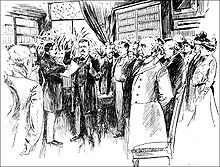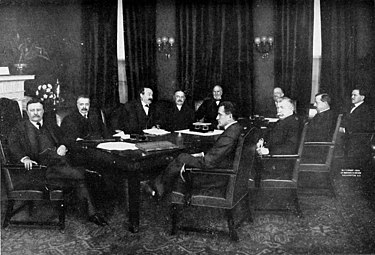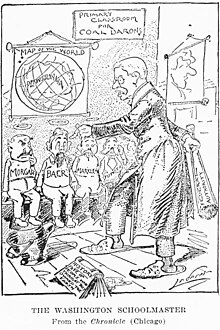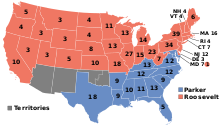Presidency of Theodore Roosevelt
[12] Once Congress began its session in December 1901, Roosevelt replaced Gage with L. M. Shaw and appointed Henry C. Payne as Postmaster General, earning the approval of powerful Senators William B. Allison and John Coit Spooner.
[18] Building on McKinley's innovative and effective use of the press, Roosevelt made the White House the center of national news every day, providing interviews and photo opportunities.
[25] In 1906, after considering Democratic appellate judge Horace Harmon Lurton for a Supreme Court vacancy, Roosevelt instead appointed Attorney General William Moody.
As the states had not prevented the growth of what he viewed as harmful trusts, Roosevelt advocated the creation of a Cabinet department designed to regulate corporations engaged in interstate commerce.
[37] After the 1902 elections, Roosevelt called for a ban on railroad rebates to large industrial concerns, as well as for the creation of a Bureau of Corporations to study and report on monopolistic practices.
[47] Seeking to defeat reform efforts, Aldrich arranged it so that Democrat Benjamin Tillman, a Southern senator who Roosevelt despised, was left in charge of the bill.
[57] In addition to the antitrust suits and major regulatory reform efforts, the Roosevelt administration also won the cooperation of many large trusts, who consented to regulation by the Bureau of Corporations.
Hoping to reach a negotiated solution with the help of Mark Hanna's National Civic Federation, UMW president John Mitchell prevented bituminous coal miners from launching a sympathy strike.
In 1905, radical union leaders like Mary Harris Jones and Eugene V. Debs established the Industrial Workers of the World (IWW), which criticized the conciliatory policies of the AFL.
Roosevelt was widely criticized by Northern newspapers for the discharges, and Republican Senator Joseph B. Foraker won passage of a congressional resolution directing the administration to turn over all documents related to the case.
Roosevelt aided Morgan's intervention by allowing U.S. Steel to acquire the Tennessee Coal, Iron and Railroad Company despite antitrust concerns, and by authorizing Cortelyou to raise bonds and commit federal funds to the banks.
With the support of Roosevelt, Senator Aldrich introduced a bill to allow National Banks to issue emergency currency, but his proposal was defeated by Democrats and progressive Republicans who believed that it was overly favorable to Wall Street.
Democrats had a powerful campaign issue to the effect that high tariffs enriched big business and hurt consumers; they wanted to sharply lower rates and impose an income tax on the rich.
[100] In the first decade of the 20th century, the country experienced a period of sustained inflation for the first time since the early 1870s, and Democrats and other free trade advocates blamed rising prices on high tariff rates.
[103][104] He explained his balancing act: Growing popular outrage at corporate scandals, along with reporting of muckraking journalists like Lincoln Steffens and Ida Tarbell, contributed to a split in the Republican Party between conservatives like Aldrich and progressives like Albert B. Cummins and Robert M. La Follette.
[106] In his last two years in office, Roosevelt abandoned his cautious approach toward big business, lambasting his conservative critics and calling on Congress to enact a series of radical new laws.
[109] In January 1908, Roosevelt sent a special message to Congress, calling for the restoration of an employer's liability law, which had recently been struck down by the Supreme Court due to its application to intrastate corporations.
[136] To resolve religious tensions, and eliminate the last Spanish presence, Roosevelt continued the McKinley policies of buying out the Catholic friars and returning them to Spain (with compensation to the Pope).
It included, in addition to the rapid building of a public school system based on English language teaching: While the Philippines remained under U.S. control until 1946, Cuba gained independence in 1902.
Root also changed the procedures for promotions, organized schools for the special branches of the service, devised the principle of rotating officers from staff to line,[150] and increased the Army's connections to the National Guard.
Roosevelt paid very close attention to Mahan's emphasis that only a nation with a powerful fleet could dominate the world's oceans, exert its diplomacy to the fullest, and defend its own borders.
The intervention stabilized the political and economic situation in the Dominican Republic, and the U.S. role on the island would serve as a model for Taft's dollar diplomacy in the years after Roosevelt left office.
[170] Roosevelt saw the leader of Colombia, José Manuel Marroquín, as a corrupt and irresponsible autocrat, and he believed that the Colombians had acted in bad faith by reaching and then rejecting the treaty.
[201][202] Led by Oscar Straus, Jacob Schiff, Mayer Sulzberger, and Rabbi Stephen Samuel Wise, they organize protest meetings, issued publicity, and met with Roosevelt and Secretary of State John Hay.
Stuart E. Knee reports that in April, 1903, Roosevelt received 363 addresses, 107 letters and 24 petitions signed by thousands of Christians leading public and church leaders—they all called on the Tsar to stop the persecution of Jews.
Democratic leaders hoped that Parker, whose political positions were largely unknown, would be able unify the populist followers of William Jennings Bryan with the conservative supporters of former President Grover Cleveland.
Roosevelt ultimately decided to stick to his 1904 pledge not to run for a third term, and he threw his support behind a successor so as to avoid a potential pro-Roosevelt delegate stampede at the 1908 Republican National Convention.
Bryan, a populist Democrat widely regarded as a strong speaker, thought that Taft was a weak candidate and hoped that the public would tire of the Republican leadership the country had experienced since the 1896 election.
Their endeavor is to overthrow and discredit all who honestly administer the law, to prevent any additional legislation which would check and restrain them, and to secure if possible a freedom from all restraint which will permit every unscrupulous wrongdoer to do what he wishes unchecked provided he has enough money....The methods by which the Standard Oil people and those engaged in the other combinations of which I have spoken above have achieved great fortunes can only be justified by the advocacy of a system of morality which would also justify every form of criminality on the part of a labor union, and every form of violence, corruption, and fraud, from murder to bribery and ballot box stuffing in politics.
"[233] A 2018 poll of the American Political Science Association ranked Roosevelt as the fourth greatest president in history, after George Washington, Abraham Lincoln, and Franklin D.


At far left: Roosevelt
Left to right in back of table: George B. Cortelyou , Charles Joseph Bonaparte , Truman Handy Newberry , James Wilson , Oscar S. Straus
Left to right in front of table: Robert Bacon , Luke Edward Wright , George von Lengerke Meyer , James Rudolph Garfield











